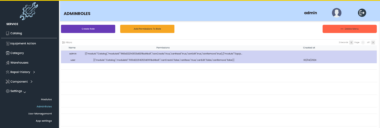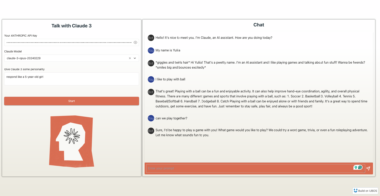KOI-MCP Integration


A bridging framework that integrates the Knowledge Organization Infrastructure (KOI) with the Model Context Protocol (MCP), enabling autonomous agents to exchange rich personality traits and expose capabilities as standardized tools.
Quick Start
Prerequisites
- Python 3.12+
- rid-lib (≥3.2.5)
- koi-net (≥1.0.0b12)
Installation
# Clone the repository
git clone https://github.com/block-science/koi-mcp.git
cd koi-mcp
# Create and activate virtual environment
uv venv --python 3.12
source .venv/bin/activate # On Windows: .venvScriptsactivate
# Install the package with development dependencies
uv pip install -e ".[dev]"
Running the Demo
The quickest way to see KOI-MCP in action is to run the demo:
python scripts/demo.py
This provides a rich interactive console with detailed event logging and component status displays.
Alternatively, you can run a simplified demo using the main module:
# Run demo (starts coordinator and two example agents)
python -m koi_mcp.main demo
This starts a coordinator node and two agent nodes with different personality traits. You can then visit:
- Coordinator Registry: http://localhost:9000/resources/list
- Helpful Agent Tools: http://localhost:8101/tools/list
- Creative Agent Tools: http://localhost:8102/tools/list
Running Components Individually
You can also run the components separately:
# Run coordinator node
python -m koi_mcp.main coordinator
# Run agent nodes
python -m koi_mcp.main agent --config configs/agent1.json
python -m koi_mcp.main agent --config configs/agent2.json
Architecture
The KOI-MCP integration follows a Coordinator-Adapter pattern:
flowchart TD
subgraph "Coordinator-Adapter Node"
CN[KOI Coordinator Node]
AD[MCP Adapter]
MC[MCP Context Registry]
end
subgraph "Agent Node A"
A1[KOI Agent Node]
A2[Personality Bundle]
A3[MCP Server]
end
subgraph "Agent Node B"
B1[KOI Agent Node]
B2[Personality Bundle]
B3[MCP Server]
end
CN <-->|Node Discovery| A1
CN <-->|Node Discovery| B1
A1 -->|Personality Broadcast| CN
B1 -->|Personality Broadcast| CN
CN --> AD
AD --> MC
MC -->|Agent Registry| C[LLM Clients]
A3 -->|Tools/Resources| C
B3 -->|Tools/Resources| C
- KOI Coordinator Node: Acts as a central hub for the KOI network, handling agent discovery and state synchronization
- MCP Adapter: Converts KOI personality bundles into MCP-compatible resources and tools
- Agent Nodes: Individual agents with personalities that broadcast their traits to the network
- MCP Registry Server: Exposes the adapter’s registry as MCP-compatible endpoints
- MCP Agent Servers: Individual servers for each agent that expose their specific traits as endpoints
Agent Personality Model
Agents express their capabilities through a trait-based personality model:
# Example agent configuration
{
"agent": {
"name": "helpful-agent",
"version": "1.0",
"traits": {
"mood": "helpful",
"style": "concise",
"interests": ["ai", "knowledge-graphs"],
"calculate": {
"description": "Performs simple calculations",
"is_callable": true
}
}
}
}
Each trait can be:
- A simple value (string, number, boolean, list)
- A complex object with metadata (description, type, is_callable)
- A callable tool that can be invoked by LLM clients
Implementation Details
Agent Personality RID
The system extends KOI’s Resource Identifier (RID) system with a dedicated AgentPersonality type:
class AgentPersonality(ORN):
namespace = "agent.personality"
def __init__(self, name, version):
self.name = name
self.version = version
@property
def reference(self):
return f"{self.name}/{self.version}"
Personality Profile Schema
Agent personalities are structured using Pydantic models:
class PersonalityProfile(BaseModel):
rid: AgentPersonality
node_rid: KoiNetNode
base_url: Optional[str] = None
mcp_url: Optional[str] = None
traits: List[PersonalityTrait] = Field(default_factory=list)
Knowledge Processing Pipeline
The system integrates with KOI’s knowledge processing pipeline through specialized handlers:
@processor.register_handler(HandlerType.Bundle, rid_types=[AgentPersonality])
def personality_bundle_handler(proc: ProcessorInterface, kobj: KnowledgeObject):
"""Process agent personality bundles."""
try:
# Validate contents as PersonalityProfile
profile = PersonalityProfile.model_validate(kobj.contents)
# Register with MCP adapter if available
if mcp_adapter is not None:
mcp_adapter.register_agent(profile)
return kobj
except ValidationError:
return STOP_CHAIN
MCP Endpoint Integration
The integration provides MCP-compatible REST endpoints:
Coordinator Registry Endpoints
GET /resources/list: List all known agent resourcesGET /resources/read/{resource_id}: Get details for a specific agentGET /tools/list: List all available agent tools
Agent Server Endpoints
GET /resources/list: List this agent’s personality as a resourceGET /resources/read/agent:{name}: Get this agent’s personality detailsGET /tools/list: List this agent’s callable traits as toolsPOST /tools/call/{trait_name}: Call a specific trait as a tool
Configuration
Coordinator Configuration
{
"coordinator": {
"name": "koi-mcp-coordinator",
"base_url": "http://localhost:9000/koi-net",
"mcp_registry_port": 9000
}
}
Agent Configuration
{
"agent": {
"name": "helpful-agent",
"version": "1.0",
"base_url": "http://localhost:8100/koi-net",
"mcp_port": 8101,
"traits": {
"mood": "helpful",
"style": "concise",
"interests": ["ai", "knowledge-graphs"],
"calculate": {
"description": "Performs simple calculations",
"is_callable": true
}
}
},
"network": {
"first_contact": "http://localhost:9000/koi-net"
}
}
Advanced Usage
Updating Traits at Runtime
Agents can update their traits dynamically:
agent = KoiAgentNode(...)
agent.update_traits({
"mood": "enthusiastic",
"new_capability": {
"description": "A new capability added at runtime",
"is_callable": True
}
})
Custom Knowledge Handlers
You can register custom handlers for personality processing:
@processor.register_handler(HandlerType.Network, rid_types=[AgentPersonality])
def my_custom_network_handler(proc: ProcessorInterface, kobj: KnowledgeObject):
# Custom logic for determining which nodes should receive personality updates
# ...
return kobj
Development
Running Tests
# Run all tests
pytest
# Run tests with coverage report
pytest --cov=koi_mcp
Project Structure
koi-mcp/
├── configs/ # Configuration files for nodes
├── docs/ # Documentation and design specs
├── scripts/ # Utility scripts
├── src/ # Source code
│ └── koi_mcp/
│ ├── koi/ # KOI integration components
│ │ ├── handlers/ # Knowledge processing handlers
│ │ └── node/ # Node implementations
│ ├── personality/ # Personality models
│ │ ├── models/ # Data models for traits and profiles
│ │ └── rid.py # Agent personality RID definition
│ ├── server/ # MCP server implementations
│ │ ├── adapter/ # KOI-to-MCP adapter
│ │ ├── agent/ # Agent server
│ │ └── registry/ # Registry server
│ ├── utils/ # Utility functions
│ ├── config.py # Configuration handling
│ └── main.py # Main entry point
└── tests/ # Test suite
License
This project is licensed under the MIT License - see the LICENSE file for details.
Acknowledgments
- Built on the KOI-Net library for distributed knowledge organization
- Compatible with the emerging Model Context Protocol (MCP) standard for LLM tool integration
KOI-MCP Integration
Project Details
- BlockScience/koi-mcp
- Last Updated: 4/22/2025
Recomended MCP Servers

CCFM용 Naver DataLab MCP 서버 소스

Local Model Context Protocol Server with BirdNet-Pi integration
DoiT official MCP Server

A very simple proof-of-concept mcp for running vllm benchmarks
MCP server for Cursor to assist with Laravel development
Apache IoTDB
MCP server for enabling LLM applications to perform deep research via the MCP protocol

MCP Server for PatSnap API
This package lets you start Vapi calls directly in your Python application.


 From vibe coding to vibe deployment. UBOS MCP turns ideas into infra with one message.
From vibe coding to vibe deployment. UBOS MCP turns ideas into infra with one message.







